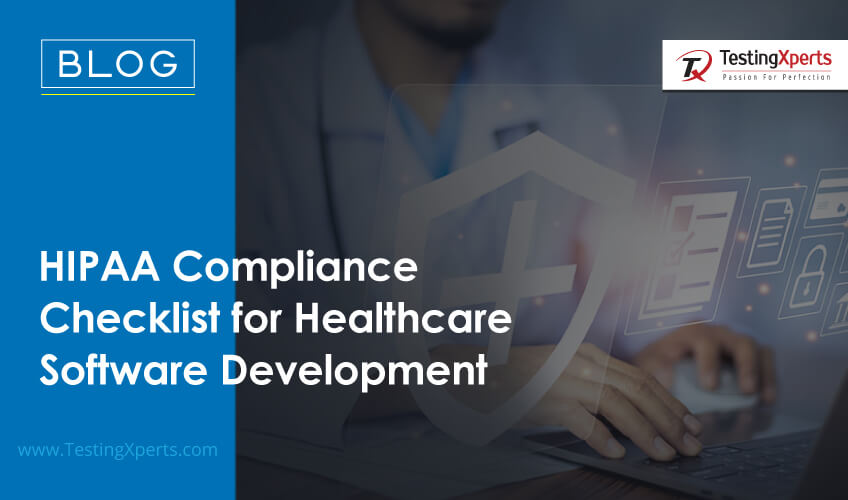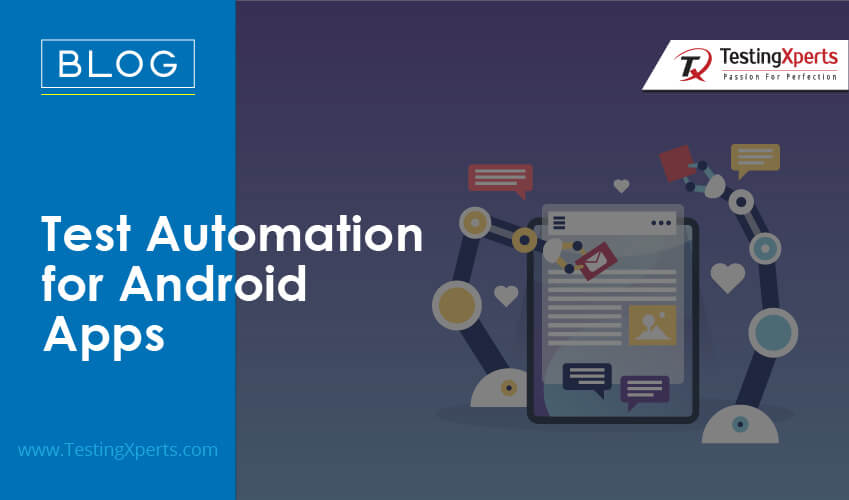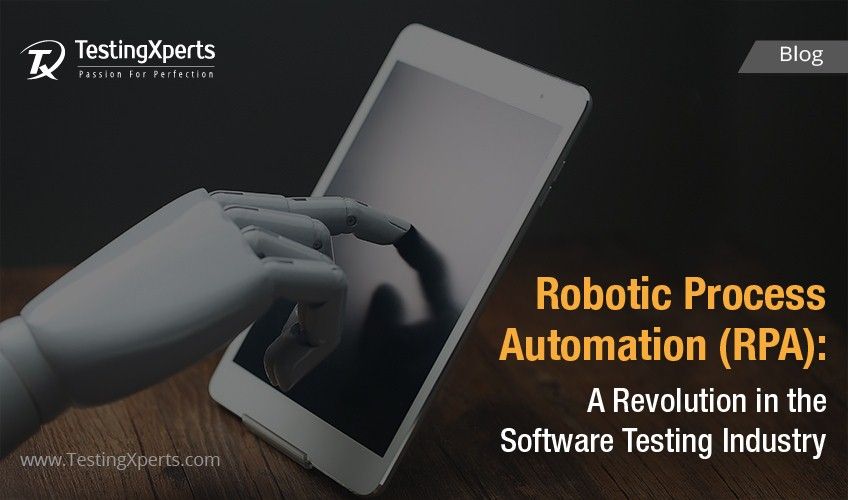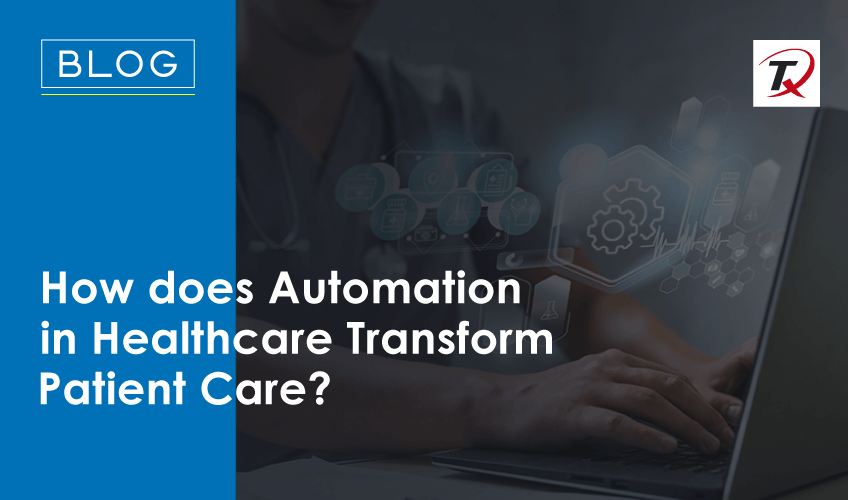
Table of Contents
- What is Healthcare Automation?
- Why Automation in Healthcare Is Necessary?
- 10 Key Areas Where Healthcare Automation is Crucial
- How to Implement Automation in Healthcare?
- Conclusion
- Why Choose TestingXperts for Healthcare Automation Testing?
Consistent demand for better healthcare and the increase in supply chain complexities and operational costs are forcing healthcare companies to look for alternatives to meet these demands. Another issue is the competition due to the increasing usage of digital technologies like AI, RPA, etc. These technologies are transforming patient care and encouraging traditional hospitals to adopt them. The shortage of doctors is another reason automation is necessary in the healthcare industry. According to statistics, the US might need up to 124000 more doctors than they currently have by 2034. At the same time, the number of patients will grow drastically, especially older ones with extra medical care.
So, what’s the solution? Artificial intelligence is among the top technologies reshaping healthcare automation. From predicting patient care requirements to helping doctors diagnose diseases faster and more accurately, this technology can save on costs and improve patient care. Whether it’s about using intelligent systems to ensure no harmful drug interactions or using AI chatbots to provide personalized user experience, automation is no longer the future – it’s the present.
What is Healthcare Automation?
Automation in healthcare is about using technology and digital tools to make healthcare processes faster and easier. It’s similar to having smart tools to handle routine tasks in clinics and hospitals. Doctors and other staff can focus more on patients and less on paperwork or repetitive tasks.
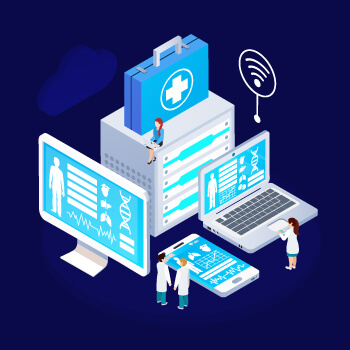
• Automation helps in managing patient records electronically on cloud or computer devices. It makes it faster to find and update patient information.
• It allows the automatic scheduling of appointments based on the doctor’s availability and patient needs. This, in turn, reduces waiting time and allows patients to see their doctors easily.
• It helps in medication management by alerting patients about their medication timing and letting doctors know in case of any issues (allergies to a certain drug, PHI, etc.)
• Doctors can keep a check on patients from a distance with remote monitoring.
• AI can help analyze medical data and find patterns, allowing doctors to diagnose diseases faster and start the treatment as soon as possible.
• Healthcare robotic process automation helps manage the supply chain and inventory, and assists in surgeries. It will make processes safer and more efficient.
• Automation supports telehealth, allowing patients to talk to doctors via video calls or messages. This is very helpful for patients who cannot get to a clinic or hospital.
Why Automation in Healthcare Is Necessary?
The rising demand for efficient and quality patient care has made automation a necessity step in the healthcare industry. With challenges like rising medical costs, workforce shortage, and increasing patient numbers, integrating tech innovations in healthcare has become crucial. Here’s why healthcare automation is necessary:
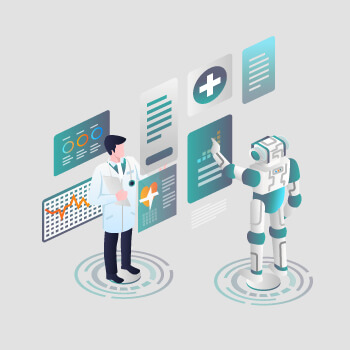
• Healthcare facilities are getting crowded with each passing day. Automation helps in efficient patient management using technologies like AI, RPA, etc., allowing hospitals to provide better service without compromising care quality.
• Human errors, though unintentional, could cause serious consequences in healthcare. Automated software systems are necessary to minimize errors like medication dispensing, dosage calculations, etc.
• A good portion of healthcare professionals’ time is consumed by administrative tasks. Automating healthcare software can streamline these tasks, including appointment scheduling, insurance processing, and medication management, allowing staff to focus on patient care.
• Automation facilitates faster task completion, making it cost-effective compared to manual methods. It is an important factor for healthcare institutes with budget constraints.
10 Key Areas Where Healthcare Automation is Crucial
Automation in healthcare is essential in several areas that play a critical role in optimizing patient care and operational efficiency. Here are ten key areas where healthcare automation is necessary:
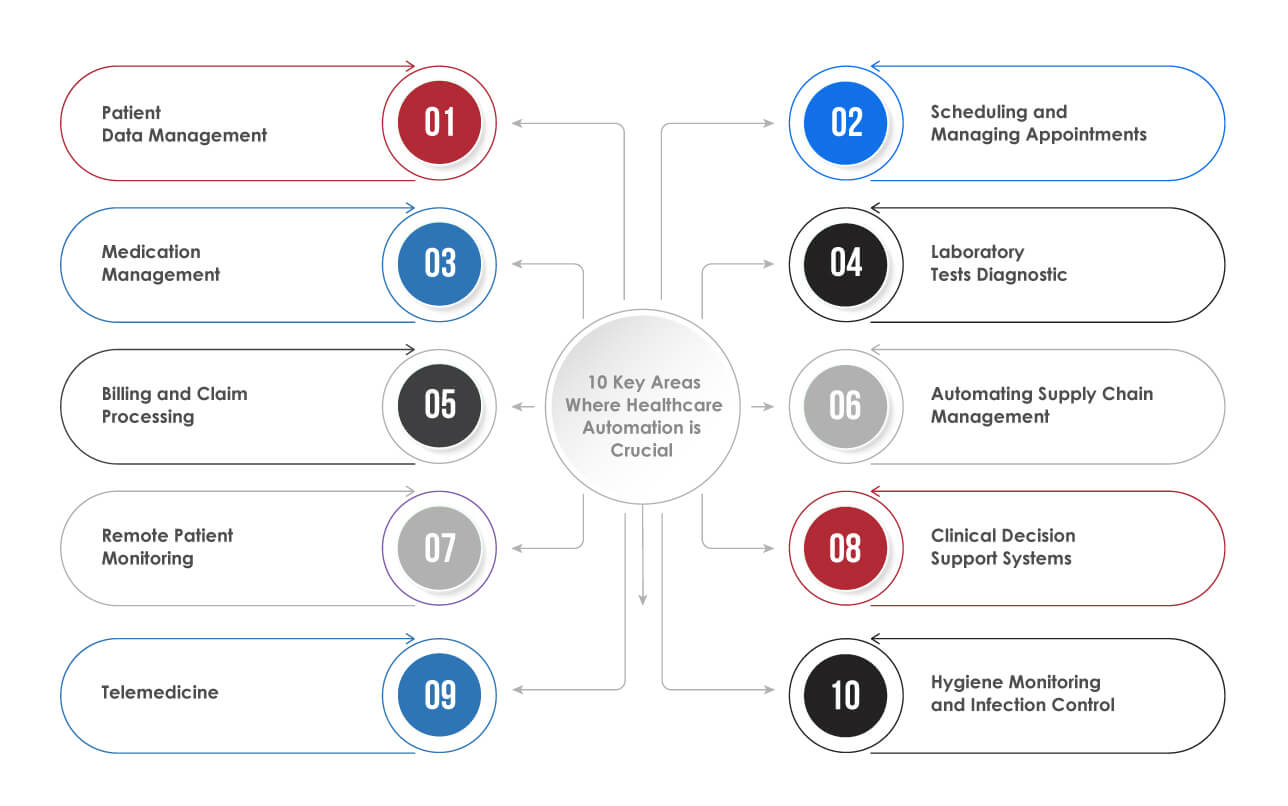
Patient Data Management
Automation upscale patient record keeping from an error-prone process into a streamlined, efficient system. EHRs allow real-time updating and sharing of patient information among healthcare providers. It ensures that every patient care team member can access updated data, supporting better-informed decisions and coordinated care. Advanced EHR systems can trigger alerts whenever there’s any issue related to medication interaction.
Scheduling and Managing Appointments
Automated schedule management allows patients to book appointments online. Healthcare providers can manage their schedules to reduce wait time and improve patient care. The system can automatically remind patients about their appointments and provide data analytics to improve operational efficiency.
Medication Management
Automated dispensing systems accurately dispense medication and reduce human errors. These systems contain medication distribution records, which are crucial for patient safety and regulatory compliance. Automated dose reminders also improve adherence to treatment standards, a key aspect of medication results.
Laboratory Tests Diagnostic
In medical labs, automation accelerates the test processing, from blood work to image scanning. It enhances the test results’ accuracy, reduces analytics time, and allows lab personnel to focus on complex tasks. These are important aspects of timely diagnoses and treatment plans.
Billing and Claim Processing
Automating billing and insurance claim processing reduces the administrative workload on healthcare providers. These systems process claims, verify insurance eligibility and handle billing cycles efficiently. They speed up the reimbursement process and minimize errors to prevent claim rejections and delays.
Automating Supply Chain Management
Supply chain management automation ensures healthcare facilities are always stocked with essential supplies. Inventory management tracks stock levels in real time, predicts future requirements according to usage patterns, and automatically reorders supplies when necessary. RPA is vital in avoiding shortages or overstocking critical items like medications, PPE (personal protective equipment), etc.
Remote Patient Monitoring
Automation allows remote patient monitoring, greatly benefiting those with chronic conditions. Home monitoring systems and wearable devices consistently collect health data like blood sugar level, blood pressure, heart rate, etc., and transmit it to healthcare institutes. It allows proactive management of health conditions and alerts doctors if patients face any health issues before they become problematic.
Clinical Decision Support Systems
These systems use AI and ML technologies to analyze huge healthcare datasets. Clinical decision support systems assist doctors in diagnosing and devising treatment plans by highlighting potential risks and recommendations. They are a valuable tool for healthcare professionals to make informed decisions.
Telemedicine
Telemedicine allows patients to consult with healthcare providers remotely. This is very helpful for individuals living in remote areas or those having mobility issues. Telemedicine platforms offer various services, from video consultations to remote monitoring, improving healthcare access.
Hygiene Monitoring and Infection Control
Automated software systems are vital for infection control within healthcare facilities. They monitor adherence to hygiene protocols, identify potential outbreaks, and track infection rates. Automation facilitates real-time monitoring to maintain a safe environment for healthcare workers and patients.
How to Implement Automation in Healthcare?
Integration automation into healthcare operations is crucial for enhancing patient care and process efficiency. However, the implementation process requires following certain practices from initial requirement assets to ongoing adaptation and evaluation. The result would be the comprehensive transformation of existing workflows and practices. Let’s take a look at this strategic approach:
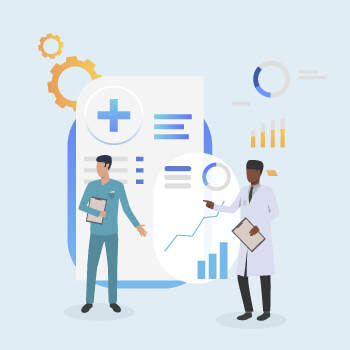
• Conduct a thorough analysis of the healthcare facility’s requirements. Identify areas with errors or inefficiencies (patient record management, appointment scheduling, drug dispensing, etc.). It will help in spotting specific challenges that require automation.
• Select tech solutions that align with the requirements, such as AI-driven diagnostic tools, EHRs, telemedicine, etc. Selecting solutions that integrate seamlessly with existing infrastructure and workflows is necessary.
• Create a detailed budget plan, including software, hardware, infrastructural upgrades, and staff training expenses.
• Communicate the automation benefits to all stakeholders, including healthcare professionals, administrative staff, and patients. It will ensure buy-in and a smooth transition.
• Implement training programs to educate staff about new technologies. Having continuous support post-implementation will help in addressing any challenge swiftly.
• Conduct thorough testing of the process or software applications that are getting automated. This controlled approach allows for the assessment and fine-tuning of the systems before a full-scale rollout.
• Monitor the automated systems performed at regular intervals. Collect feedback from everyone involved to assess the impact of technology on healthcare facilities.
• Have stringent security protocols to ensure compliance with healthcare regulations, particularly patient data protection.
• Stay up to date with tech innovations, as regular updates and scalability are important to stay ahead in the evolving healthcare industry.
• Regularly evaluate the impact of automation and research new technologies and methodologies to enhance patient care.
Conclusion
With the rise in healthcare demands, operational costs, and patient numbers, integrating automation in healthcare has become necessary. Technologies like AI/ML, cloud, and RPA are transforming patient care by making it more efficient and effective. From handling patient records and appointment scheduling to improving diagnosis and treatment processes, automation is gradually becoming a present-day reality in healthcare. It helps manage patient care operations, reduces human errors, and is a cost-saving concept in the long run. However, healthcare businesses should partner with a recognized automation testing services provider like TestingXperts to ensure effective implementation.
Why Choose TestingXperts for Healthcare Automation Testing?
Choosing the right automation testing partner is crucial in the healthcare industry, where technology and patient care are top priorities. TestingXperts, with its deep expertise in the healthcare domain, brings a wide set of automation testing techniques to help elevate patient care and operational quality. Here’s why Tx should be your go-to choice for implementing automation in healthcare:
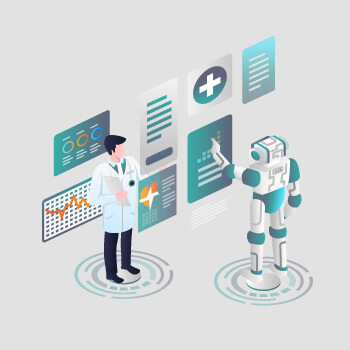
• Our experts understand the complex automation requirements of the healthcare industry. Their in-depth knowledge ensures that the testing process aligns with healthcare-specific requirements.
• We use our in-house accelerators like Tx-Automate and Tx-HyperAutomate to help you identify and solve complex challenges in automation.
• Recognizing the criticality of healthcare compliance, we adhere to industry regulatory standards like HIPAA, PCI DSS, etc., to ensure patient data safety and legal conformity.
• We offer tailored testing solutions to adapt to different healthcare software automation requirements’ unique needs.
• Our team is skilled and seasoned in healthcare automation testing. Their experience plays a vital role in navigating the complexities of healthcare automation.
• We stay abreast of the latest developments in healthcare technology, ensuring our testing methodologies remain relevant and effective in the rapidly evolving healthcare industry.
To know more, contact our QA experts now.
Discover more
Get in Touch
Stay Updated
Subscribe for more info


